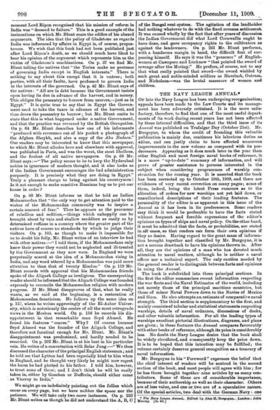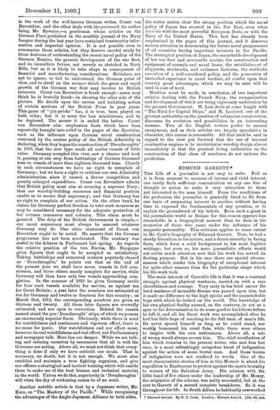THE NAVY LEAGUE ANNUAL.*
Or late the Navy League has been undergoing reorganisation; appeals have been made to the Law Courts- and its manage- ment has been adversely criticised. It is the more satis- factory, therefore, to find that one of the most useful depart- ments of its work during recent years has not been affected by these internal difficulties, and that the third issue of its Annual was published on Trafalgar Day (October 21st). Mr. Burgoyne, to whom the credit of founding this valuable publication is mainly due, continues his laborious duties as editor, and can justly claim to have effected numerous improvements in the new volume as compared with its pre- decessors. Appearing as it does much later in the year than other English and most foreign naval books of reference, it is a more " up-to-date " summary of information, and will prove of greater assistance to persons interested in the subject when considering programmes of warship con- struction for the coming year. It is asserted that the book has been corrected up to October 10th, 1909, and there are evidences of very recent correction on many pages; some of them, indeed, being the latest Press rumours as to the allocation of orders for new warships not yet laid down, or unauthorised descriptions of their leading features. The personality of the editor is as apparent in this issue of the Annual as it has been in its predecessors. Some readers may think it would be preferable to have the facts stated without frequent and forcible expressions of the editor's opinions on types of ships and naval policy. On the other hand, it must be admitted that the facts, or probabilities, are stated in all cases, so that readers can form their own opinions if they so desire. Having regard to the great mass of informa- tion brought together and classified by Mr. Burgoyne, it is not a serious drawback to have his opinions thrown in. After all, they are the opinions of a man who has devoted much attention to naval matters, although he is neither a naval officer nor a technical expert. The only caution needed by the general reader is to distinguish between facia and opinions in using the Annual.
The book is subdivided into three principal sections. In the first the editor summarises recent information respecting the war fleets and the Naval Estimates of the world, including not merely those of the principal maritime countries, but those of minor Naval Powers down to the Navies of Mexico and Siam. He also attempts an estimate of comparative naval strength. The third section is supplementary to the first, and mainly consists-of tabular and statistical statements respecting warships, details of naval ordnance, dimensions of docks, and other valuable information. For all the leading types of warships excellent pictorial illustrations, diagrams, and plans are given ; in these features the Annual compares favourably with other books of reference, although its price is considerably less. No doubt the Navy League desire that the book shall be widely circulated, and cansequently keep the price down. It is to be hoped that this intention may be fulfilled; the volume certainly deserves general recognition as a treasury of naval information.
Mr. Burgoyne in his "Foreword" expresses the belief that the chief interest of readers will be centred in the second section of the book, and most people will agree with him ; for he has there brought together nine articles by as many con- tributors. Some of these are of .considerable importance, becauseof their authorship as well as their. eharaeter. Others are of less value, end one or two are of a speculative nature. Of the special axtieles, two deal with the Gerraan Navy : one • The :Amy 1..equa Annual. Edited by Alan H. Burgoyne., Landoll: John lituray. £23. 6d.]
is the work of the well-known German writer, Count von Reventlow, and the other deals with the personnel, its author being Mr. Bywater,—a gentleman whose articles on the
German Fleet published in the monthly journal of the Navy League during the last year have contained trustworthy infor- mation and impartial opinion. It is not possible even to summarise these articles, but they deserve careful study by those desirous of understanding the recent naval policy of the German Empire, the present development of the war fleet, and its immediate future, not merely as sketched in Navy Bills, but as it is likely to take shape in consequence of financial and manufacturing considerations. Britishers are apt to ignore, or fail to understand, the German point of view, and to dwell on the menace which the great and rapid growth of the German war fleet may involve to British interests. Count von Reventlow is frank enough—some may think he is brutally frank—in showing the other side of the picture. He dwells upon the unwise and irritating action of certain sections of the British Press in past years. This game of " pin-pricks " has, it is true, been played on both sides; but it is none the less mischievous, and to be deplored. The sooner it is ended the better. Count von Reventlow also emphasises facts which have been
repeatedly brought into relief in the pages of the Spectator,
such as the influence upon German naval construction exercised by the unwise policy of the British Admiralty in declaring, when they began the construction of 'Dreadnoughts' in 1905, that the new type made all earlier vessels of little value. Germany accepted this view, saw a chance and took it, passing at one step from battleships of thirteen thousand tons to vessels of more than eighteen thousand tons. Clearly in such circumstances we have no right to complain of Germany; but we have a right to criticise our own Admiralty administration, since it caused a fiercer competition and greatly enlarged expenditure. Count von Reventlow admits that British policy must aim at securing a supreme Navy ; that our warship-building resources and financial position enable us to secure that supremacy; and that Germany has no right to complain of our action. On the other hand, he
claims for Germany perfect freedom to take such measures as may be considered necessary for the adequate protection of her overeea .commerce and colonies. This claim must be granted. The duty of the British Government is simple,— our naval supremacy must always be assured whatever Germany may do. One other statement of Count von Reventlow ought to be noted. He asserts that the German programme has not been accelerated. The contrary was stated in the debates in Parliament last spring. As regards the relative position of the two Navies, Mr. Burgoyne gives figures that ought to be accepted as satisfactory. Taking battleships and armoured cruisers popularly classed as Dreadnoughts,' he points out that at the end of the present year we shall have seven vessels in full com- mission, and three others nearly complete for service, while Germany will then have only two vessels approaching com- pletion. In the summer of 1910 he gives Germany credit for four such vessels available for service, as against ten for Great Britain; a year later the numbers are estimated at ten for Germany and twelve or fourteen for this country; on March 31st, 1912, the corresponding numbers are given as thirteen and twenty. All these later figures are avowedly estimated, and are open to correction. Behind the vessels named stand the pre-' Dreadnought' ships, of which we possess an enormously superior force. Obviously, while there is need for watchfulness and. continuous and vigorous effort, there is no cause for panic. Oar watchfulness and our effort must, however, be real watchfulness and real effort, not Parliamentary and newspaper talk. Here lies our danger. While we are talk- ing and calming ourselves by assurances that all is well the Germans are acting. Above all, we must not think that every- thing is done if only we have outbuilt our, rivals. That is necessary, no doubt, but it is not enough. We must also establish and maintain a true fighting organism, and give our officers a strategical and tactical training which will enable them to make use of-the -best-human and - technical material in the world. Unless we do this, superiority_in 'Dreadnoughts' will when the day of reckoning comes be of no avail.
Another notable article is that by a Japanese writer, Mr. Kato, on "The Mastery of the Pacific." While recognising the advantages of the Anglo-Japanese Alliance to both sides, the writer makes clear the strong position which the naval policy of Japan has secured in the Far East, even when vie-d-vis with the most powerful European fleets, or with the Navy of the -United States. This fact has already been emphasised in the pages of this journal, and it deserves serious attention in determining the future naval programmes of all countries having important interests in the Pacific. The strategical position of Japan, the remarkable development of her war fleet and mercantile marine, the construction and equipment of arsenals and naval bases, the establishmcnt of shipyards, steelworka, and ordnance factories, the methodic execution of a well-considered policy, and the possession of unrivalled experience in naval warfare, all confer upon that country great advantages, which we may be sure will be used in case of need.
Mention must be made, in conclusion, of two important articles dealing with the French Navy, the reorganisation and development of which are being vigorously undertaken by the present Government. M. Loir deals at some length with "The Need for Capital Ships," and M. Laubeuf, one of the greatest authorities on the question of submarine construction, discusses its evolution and possibilities in an interesting manner. Two of the English writers prefer to remain anonymous, and as their articles are largely speculative in character, this course is reasonable. All that need be said in regard to the view put forward that the use of internal combustion engines is to revolutionise warship design almost immediately is that the greatest living authorities on the construction of that class of machines do not endorse the prediction.

























































 Previous page
Previous page